How Many People in Japan Speak English?
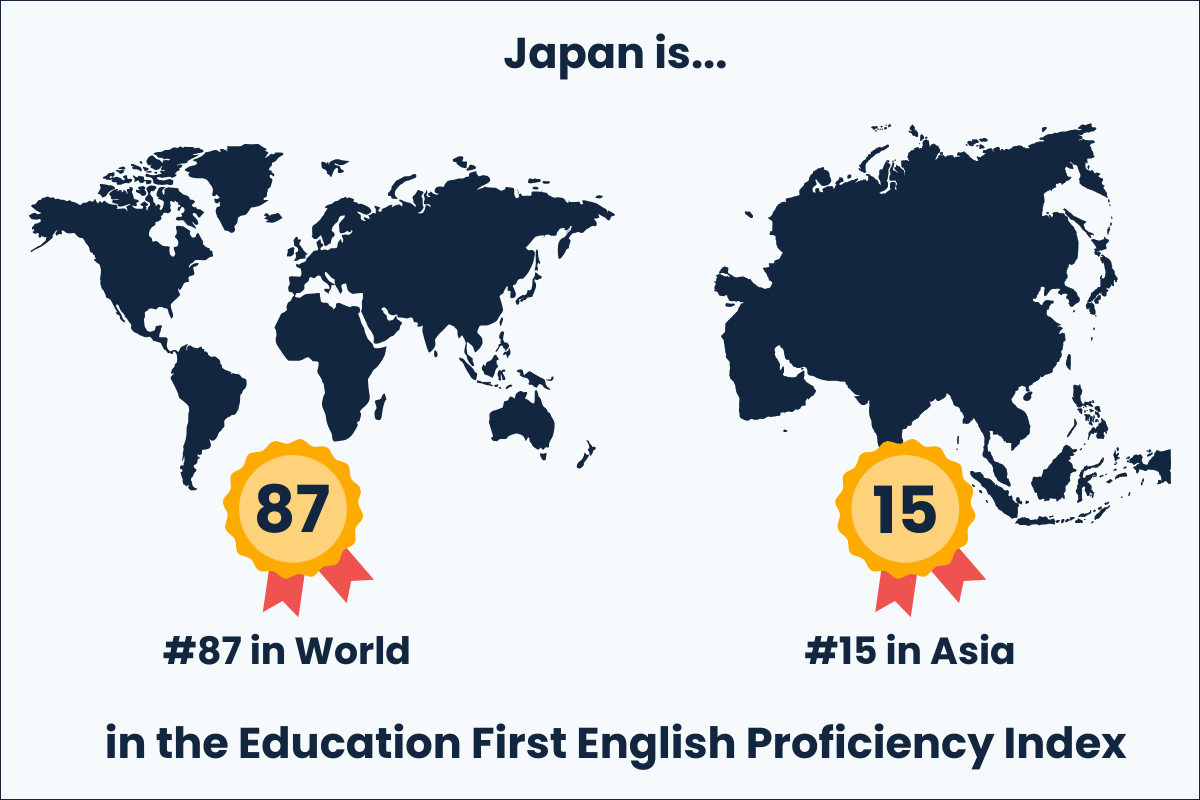
The Japanese constitution doesn’t name an official language but roughly 99% of people (over 123 million) in Japan speak Japanese as their main language. There are also other languages spoken in Japan, including various regional, indigenous, and minority languages like Ainu and Okinawan.
Most Japanese people also study foreign languages, with English being compulsory in all schools. However, that doesn’t make English widely spoken in the country. In fact, the Japanese population speaking English is quite small.
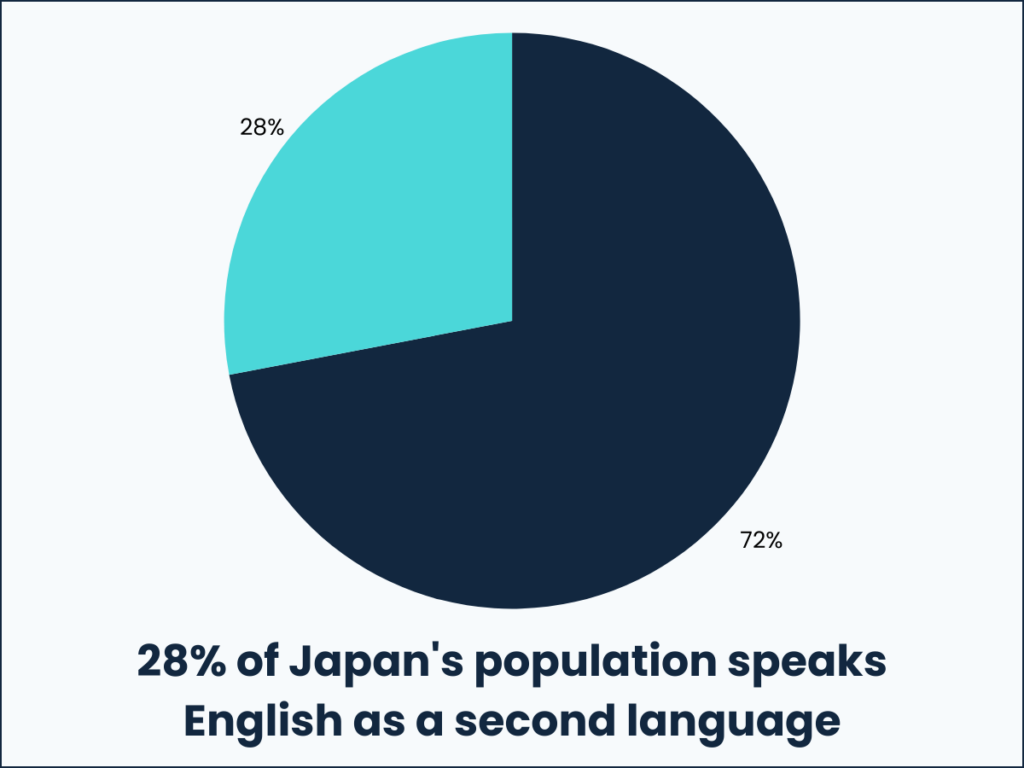
Estimates vary, but most surveys show that less than 20-30% of the Japanese population speaks English fluently. The 2023 English Proficiency Index ranks Japan 87th out of 113 countries, and 15th in Asia.
There’s a sharp contrast in English skills between Japan and other highly developed countries, especially those in the European Union. However, English language trends in the country are mostly positive, as you’ll see in the following article.
Keep reading to find out more about English in Japan!
Number of English Speakers in Japan (General Stats)
By and large, Japanese people have a positive attitude towards the English language. Younger people show great enthusiasm towards learning it, and speaking English fluently is seen as a status symbol in Japan. At the same time, very few Japanese speak English, and even fewer are confident in their English skills.
Here’s a more in-depth look at Japan’s English language trends:
- Surveys show that roughly 15-28% of the Japanese population (18-34 million) speaks English. Estimates vary from one source to another.
- Less than 2% of English speakers in Japan are thought to speak English with a high degree of fluency (a CEFR level of B2-C1). Most English speakers in Japan have a B1 (intermediate) level.
- The majority of Japanese people who don’t speak English still know the language at an A1-A2 level (beginner to elementary). People at this level can recognize and use common words and basic phrases, but can’t hold a conversation.
- Roughly 31-41% of Japanese people don’t know English at all.
- There were just 94,758 native English speakers living in Japan in 2021, most of them from the U.S.
- Japan ranks #87 worldwide in terms of English skills, having a proficiency score of 457 out of 800 in 2023.
- Tōkyō has the best English speakers in Japan, reaching an EPI score above 500 in 2023.
- The share of English learners in Japan is on the rise, having gone from 9.6% of the population in 2011 to 12.8% in 2021.
- Most English learners in Japan are under 25 years old. Less than 15% of people between 30-39 were learning English in 2021, compared to nearly 27% of people between 20-24 and nearly 39% of those between 15-19 years old.
- Until 2002, English was a compulsory discipline only starting in junior high school. Japanese students would start mandatory English classes at the age of 12-13.
- In 2011, elementary schools in Japan introduced mandatory English classes starting in 5th grade (age 10), though many schools only offered 1 hour of English instruction per week.
- The 2020 Tōkyō Olympics influenced a shift in Japan’s English education. Since 2020, the school curriculum has focused more on competencies like speaking and writing. High school English teachers were also urged to teach primarily in English.
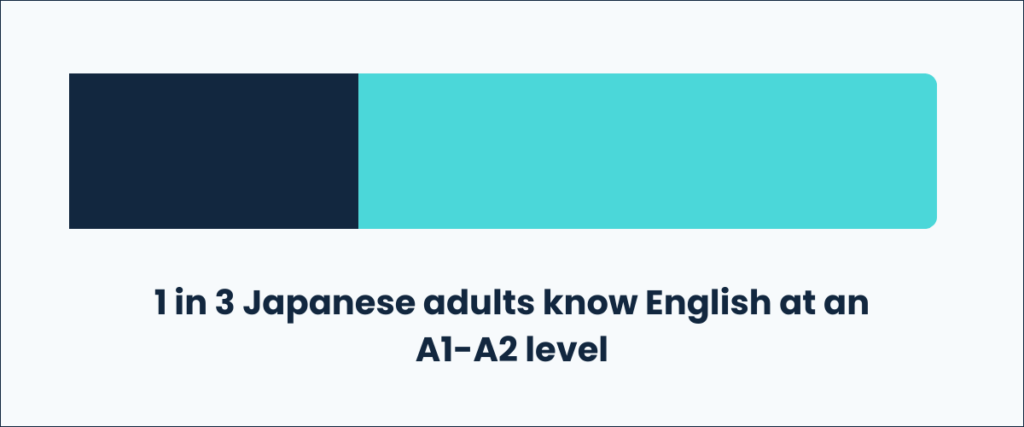
The most common estimates about English speakers in Japan come from two surveys.
The first one was published in 2013 by Cross Marketing Inc., a marketing research agency in Japan. It had a sample size of 1,200 men and women aged 20-49. More than 70% of respondents said they couldn’t speak English, although 30.4% of all surveyed people knew basic words and phrases. Just 28% said they could speak the language.
The second survey was published in 2018 by Oricon Inc. The sample size was 1,000 people aged 10-50 years old. Roughly 53% of respondents said they knew basic English words and phrases, 13% said they could hold a regular conversation in English, and 1.7% said they spoke English at an advanced level.
It’s worth mentioning that neither of the surveys included adults over 50. A larger share of people surveyed in 2018 said they knew basic English words and phrases. This is likely partly due to the inclusion of teenagers in the study. Many of them had already started learning English in elementary school by the time of the survey.
Sources: Economic News, Oricon, IPSS, Education First, Statista 1 & 2, Ehime University, ITA
Why Don’t More People in Japan Speak English?
Japan is one of the most educated countries in the world, according to OECD statistics. The country consistently ranks among the top 10 nations with the best PISA scores in mathematics, science, and reading. It closely competes with its neighbor, South Korea, and often surpasses Nordic countries like Finland or Sweden.
However, Japan lags in English skills, taking 15th place out of 23 countries in Asia. Japan’s English proficiency is well behind South Korea’s, and over 150 points below Scandinavian countries.
Why is there such a large English gap between Japan and other highly educated nations? Well, multiple factors contribute to lower English attainment in Japan:
School curriculum:
English has been mandatory in Japanese schools for decades now. However, most students in Japan would start English classes in high school and receive fewer hours of language instruction than those in other countries. In primary and middle schools, English was solely an elective course until the turn of the 21st century.
Teaching methods are also partly to blame for the low English proficiency. After WW2, English became a core subject for high school and university entrance examinations in Japan. The goal was to prepare students for taking standardized tests, and the main teaching method used in the classroom was the grammar-translation method.
Traditional methods are great for practicing vocabulary and grammar but don’t encourage the active and natural use of English. Listening and speaking didn’t receive much attention until 2009 when the education ministry urged a shift to communicative teaching methods in high schools. In 2013, communicative language teaching was extended to middle schools. But it’s still too early to notice a population-wide change in proficiency.
Language differences:
“Is it hard to learn?” – This is the most common question for people picking up a new language. The best answer is “Compared to what?” Each language has its unique challenges, but a learner’s background matters. Learning a language similar to your mother tongue will naturally feel easier than starting from scratch.
Unfortunately, English and Japanese are worlds apart. English is a Germanic language, and part of the Indo-European linguistic family. Japanese is a language isolate, so it’s linguistically unrelated to other languages. As a result, English and Japanese have completely different grammar, phonetics, writing systems, and core vocabularies.
Learning English as a Japanese speaker takes considerable time and effort, given these broad language differences. The reverse is also true; the Japanese language is among the hardest languages to learn for native English speakers.
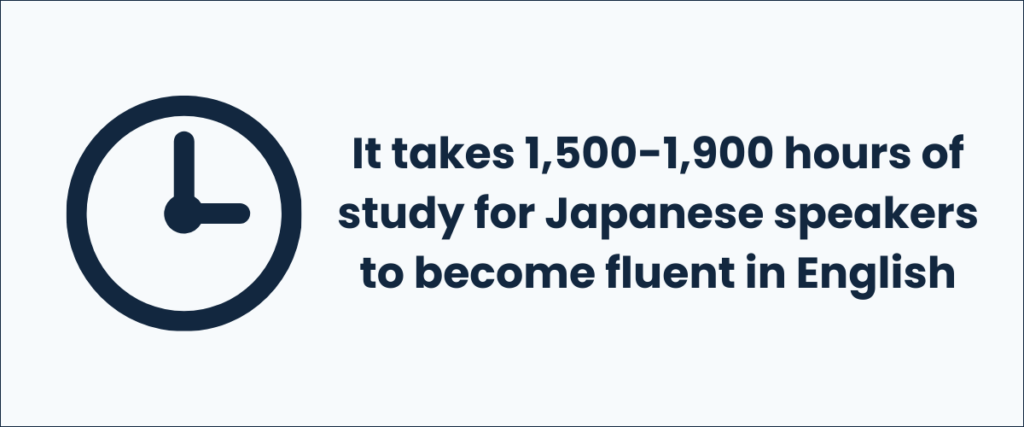
According to CEFR estimates, it should take roughly 800 hours of active study to reach a reasonable level of English fluency. However, estimates from Japan’s ECC Foreign Language Institute are twice as high. For native Japanese speakers, it takes roughly 1,500-1,900 hours to become fluent in English.
In contrast to Japan, the countries with the best English skills are either speaking languages closely related to English or using English as a co-official language. The Netherlands, Austria, Germany, and the Scandinavian nations, in particular, speak Germanic languages which are very similar to English.
Social environment:
According to Norihiko Inoue, the regional enrollment director at Education First Japan, students in the country are actually very good at grammar and vocabulary. However, most can’t communicate well in English because they’re afraid of making mistakes. This risk aversion is a big setback in achieving English fluency.
English learners in Japan also have fewer opportunities to practice their speaking or listening skills in daily life. Japan has been largely isolated historically, and learning a second language remains optional for many Japanese people. Even considering the increased enthusiasm for foreign cultures, only 15% or less of Japanese people have been traveling overseas over the past few decades.
Furthermore, a 2011 study conducted by Ryuko Kubota, professor of language literacy and education at the University of British Columbia, showed that English skills weren’t important to career advancement in Japan. Things are slowly changing as large Japanese corporations are increasingly adopting an international outlook. Still, many working-age people in Japan may not have a strong financial incentive to learn English.
Sources: OECD, Education First, ERIC, The Japan Times, Cambridge English, ECC, Foreign Policy, JTB Tourism Research & Consulting
English Speakers in Japan by Region
Younger people are the most likely to speak English in Japan. This demographic is also most likely to live in highly urbanized and densely populated regions. Taking these factors into account, the regions with the most English speakers are likely to be:
- Kantō
- Chūbu
- Kansai
How about English skills? According to 2023 English proficiency data, the regions with the best English scores are:
- Kantō
- Kansai
- Tōhoku
- Hokkaidō
Here’s a list of all the regions with their English scores and CEFR levels:
| Region | EPI Score | Proficiency Level | CEFR Equivalent |
| Kantō | 483 | Low | B1 |
| Kansai | 471 | Low | B1 |
| Tōhoku | 464 | Low | B1 |
| Hokkaidō | 462 | Low | B1 |
| Kyūshū & Okinawa | 437 | Very Low | B1 |
| Chūbu | 432 | Very Low | B1 |
| Shikoku | 430 | Very Low | B1 |
| Chūgoku | 428 | Very Low | B1 |
The regions are evenly divided between “low” and “very low” proficiency bands. However, all scores between 400-499 fall within the B1 level on the CEFR scale. This language level is known as “intermediate,” and English learners at this level can:
- Understand the main points in standard English language materials on everyday topics (preferences, future plans, personal hopes and dreams, work, leisure activities, etc.)
- Communicate effectively in everyday scenarios (ordering food, asking for help or directions, introducing oneself, discussing future hopes and dreams, etc.)
- Express thoughts, ideas, and future plans and give short explanations to support their points
It should be noted that these scores don’t represent the regions as a whole. The yearly English proficiency test conducted by Education First is done on self-selected populations. People sign up to take the test voluntarily, and those who already know English are more likely to take the test to assess their knowledge.
As pre-2020 surveys have shown, most people in Japan likely know English at a beginner or elementary level. But out of the Japanese people who speak English with reasonable fluency, those in Northern and Central Japan scored the highest in 2023.
Sources: Education First, Council of Europe
English Speakers in Japan by City
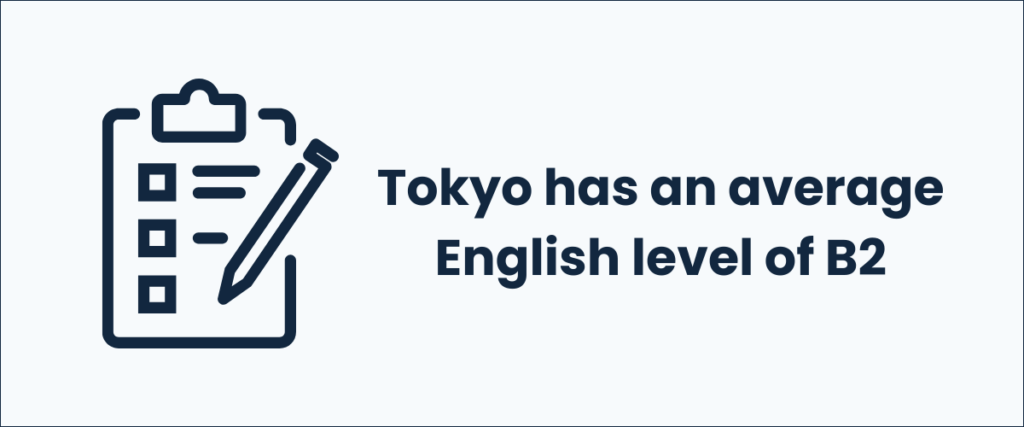
The cities with the largest population and lowest median age in Japan are the most likely to have a larger share of English speakers. These include:
- Tōkyō
- Yokohama
- Ōsaka
- Nagoya
- Fukuoka
As for the average English proficiency, Tōkyō stands out as the only city with a score above 500 points in 2023. Here’s how Japan’s cities compare in the latest EPI edition:
| City | EPI Score | Proficiency Level | CEFR Equivalent |
| Tōkyō | 503 | Moderate | B2 |
| Kyōto | 484 | Low | B1 |
| Yokohama | 472 | Low | B1 |
| Ōsaka | 464 | Low | B1 |
| Kōbe | 452 | Low | B1 |
| Nagoya | 450 | Low | B1 |
| Hiroshima | 432 | Very Low | B1 |
| Kawasaki | 431 | Very Low | B1 |
| Fukuoka | 422 | Very Low | B1 |
English proficiency statistics were only calculated for locations with 400 test takers or more, which is why we only have data on a limited number of Japanese cities.
Japan’s capital stands out for above-average English skills. Tōkyō scored 46 points above the national average and was the only city with an English level of B2. This means that Tōkyō is the city with the most fluent English speakers in Japan. Those with a B2 level in English can:
- Understand the main ideas of complex texts on various topics, including abstract and technical ones
- Speak with decent fluency and spontaneity, being able to maintain a regular conversation with a native English speaker
- Can express their viewpoints on various topics using clear and detailed language
Besides Tōkyō, cities like Kyōto, Yokohama, and Ōsaka also had English scores above the national average. People between the ages of 18 and 41+ living in these locations are not only more likely to know English, but they also speak it better than average.
The cities topping the list all have highly developed industries, especially in sectors like finance, technology, research, manufacturing, and tourism. Some of the largest companies in these cities include, but aren’t limited to:
- Toyota
- Sony
- Mitsubishi
- SoftBank
- Nintendo
- Nissan
- Hitachi
- Panasonic
- Honda
Japan’s economy has been increasingly focusing on the manufacturing sector and the exports of goods and services; 18.2% of Japan’s GDP in 2021 came from exports, compared to just 8.8% in 1994. As the de facto language of international business, English is a valuable asset for more and more local employers, who are slowly adapting to Japan’s shift towards a globalized economy.
English is also important for those in hospitality; Tōkyō, Kyōto, and Ōsaka, in particular, welcome millions of international tourists every year, so the demand for English is at an all-time high. Most large Japanese companies have at least a few English-speaking employees, especially those working in executive positions.
The 2018 survey conducted by Oricon reflects the growing interest in English among Japan’s young workforce. People in their 20s generally want to improve their English to better manage tasks at work, including answering e-mails and phone calls or discussing English documents.
Japanese people living in large tourist areas also want to improve their English to better communicate with foreigners visiting the country. Some survey respondents said they wanted to be able to give directions and help tourists when they’re in trouble.
Sources: Education First, Council of Europe, Oricon, The World Bank
English Speakers in Japan by Demographic Group

People under 30 are the most likely to know or actively learn English, and those between 26-30 have the best English skills on average. Here’s a closer look at the numbers:
- Nearly 27% of adults between 20-24 were learning English in 2021. The percentage dropped to 15% for those aged 25-29 and 13% for those between 30-39.
- Just 10% of people between 40-59 were actively learning English in the same year. Under 10% of those aged 60-69, and under 5% of those over 70 claimed to study English.
- In comparison to adults, teenagers were the most likely to learn the language. 40% of those aged 10-14 and almost 39% of those aged 15-19 claimed to study English.
- English skills among Japanese teens between 15-18 years old are on the rise. Only 31% of senior high school students attained an A2 level in English in 2013. In 2022, the number rose to almost 49%. Nearly half of high school graduates in 2022 knew basic English.
- At the same time, English proficiency for those between 18 and 25 has been declining, falling from moderate to very low between 2015 and 2023.
- Japanese people aged 26-30 have the highest proficiency on average, scoring 488 points (equivalent to a B1 level) in 2023.
- Those between 18-20 years old have the lowest proficiency in 2023, having scored just 391 points (A2 level).
- Company workers who worked in leadership positions were the most likely to speak fluent English.
- Both men and women aged 18-41 had EPI scores above 450 (B1 English level) in 2023.
- Over 50% of Japanese aged 10-50 want to learn English but the level of enthusiasm for learning drops with age.
Surprisingly, the drop in proficiency among 18–25-year-olds follows shortly after an increase in learners between 2016 and 2021. According to EF’s 2023 report, the pandemic is thought to have determined this decline. There’s also a probability that more English beginners are eager to test their skills.
The proficiency level in this age range only started dropping after 2019-2020. However, a similar decline within the same timeframe didn’t occur among high schoolers in the country. In people aged 31-41+, proficiency has been slowly increasing since 2020.
Sources: Statista 1 & 2, Education First 1 & 2, Economic News, Oricon
Conclusion
The vast majority of people in Japan don’t speak fluent English, though many know basic words and phrases. Only 20-30% of Japanese people speak English at a conversational level or above, and those under 30 make up most of this category.
Things might change in the future, as more and more Japanese adults are learning English for work or leisure activities. Children and teens are also learning English earlier, with a higher focus on speaking skills.
FAQs
Can you manage in Japan with only English?
Japan has made efforts to be more accommodating to foreign tourists since the Rugby World Cup in 2019 and the Tōkyō Olympic Games in 2021. Larger businesses around tourist spots usually have at least a few English-speaking employees.
It should be fairly easy to order food, shop for souvenirs, or book a hotel room in big cities. Product tags, restaurant menus, train tickets, and train station signs are usually bilingual. But it’s still a good idea to have a camera translation app like Google Translate on hand. The further you venture outside of big cities and into rural Japan, the larger the language barrier will become.
Do Japanese people like speaking English?
Speaking fluent English is seen as something to be proud of in Japan. However, most Japanese people aren’t confident in their language skills and are afraid of making mistakes in an English conversation.
Some Japanese people might find it hard to switch to English on the spot, or they might not know how to word their ideas. It’s best to learn a few words and basic phrases in Japanese to avoid awkward situations. You’ll also have an easier time approaching locals if you can ask for help in Japanese.
Do I need to learn Japanese to live in Japan?
Visiting Japan is different than living in Japan. Many foreigners living in the country say it’s entirely possible to relocate without speaking Japanese, though knowing the local language will save you a lot of trouble.
English is not widely spoken in Japan, so you’ll eventually encounter a language barrier in situations that require you to speak Japanese. Living in Japan without knowing the language can be an alienating experience, as it makes social interaction and access to public services difficult.